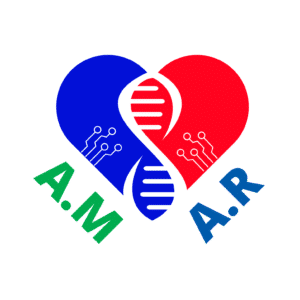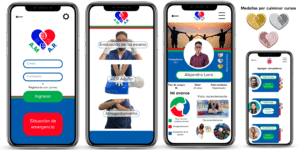SBC103 case
Transforming First Aid Education: The Impact of the A.M.A.R. App on Self-learning CPR Skills
Introduction
In the current digital era, mobile applications have revolutionized how we access information and acquire new skills. One of the areas that has undergone significant change is first aid education. The A.M.A.R. app (Multidisciplinary Assistant for Self-learning CPR) emerges as an innovative tool to promote self-learning of vital cardiopulmonary resuscitation (CPR) and first aid skills. This app not only addresses the lack of knowledge in this area but also focuses on engaging children and adolescents through a playful and educational approach. In this study, we will explore the benefits of this application in transforming first aid education and its impact on society.

Until September 2021, millions of people around the world were using mobile applications to learn various subjects. Platforms like Duolingo, Khan Academy, Coursera, and others offered a wide range of online courses spanning from languages and mathematics to programming and professional skills. These applications gained popularity among learners of all ages, from children to adults.
It’s important to note that the popularity and usage of these applications could vary based on region, technology availability, and other socioeconomic factors. If you’re interested in more recent data, I would recommend seeking updated reports and statistics on the usage of mobile learning applications from reliable sources.
Studies conducted worldwide suggest an increase in screen time among children and adolescents during the pandemic. A study published in JAMA Pediatrics shows that the average daily screen time among over 5,000 surveyed adolescents in the early months of the SARS-CoV-2 outbreak was 7.7 hours per day, which is higher than pre-pandemic estimates (3.8 hours/day).
In Europe, a study conducted from May to June 2020 across ten countries indicates that a significant percentage of minors used screens for more than 2 hours per day: on weekdays, it reached 69.5%, and on weekends, it reached 63.8%. However, these data were not positive even before the pandemic.
According to the latest Spanish health survey conducted in 2017, in Spain, 29.3% of children under 14 years old used screens for less than 1 hour daily for recreational purposes, 26.4% between 1 and 2 hours, 28.6% between 2 and 3 hours, and 15.7% more than 3 hours.
This is why we aim for children, adolescents, and adults to use their mobile devices for a positive purpose of studying.

Background
The lack of knowledge in first aid and CPR has been a persistent concern worldwide. Critical moments that require immediate interventions are often exacerbated by the lack of proper skills. The A.M.A.R. app responds to this issue by leveraging mobile technology to provide up-to-date information on first aid and CPR guidelines. Furthermore, this application stands out for its emphasis on involving children and adolescents, creating a generational shift in how emergency skills are acquired.
Social Issue and Impact on Children and Adolescents
The lack of knowledge in first aid translates into a social problem that leads to delays in proper medical attention and an increased risk of serious consequences in emergency situations. Children and adolescents, often underestimated in their capacity to learn these skills, can become agents of change. The A.M.A.R. app harnesses the youth’s familiarity with technology and offers an engaging platform to learn and practice first aid. This not only enhances the safety of future generations but also instills a culture of responsibility and care for others from a young age.
Importance of Knowing These Apps
Mobile technology and applications provide an accessible and convenient way to learn new skills. In the context of first aid and CPR, these apps can make a difference between life and death in critical situations. A.M.A.R. becomes a valuable tool to empower individuals with knowledge that can make a difference in medical emergencies. Moreover, the focus on self-learning and gamification not only increases information retention but also makes the learning process more engaging and effective.
Promotion and Education in First Aid Through App-based Games
Gamification has proven to be an effective strategy for motivating learning and active participation. A.M.A.R. draws inspiration from this methodology by incorporating games, educational videos, quizzes, and trivia. These elements not only make the learning process enjoyable but also allow users to practice their knowledge in simulated environments. Through participation in interactive and challenging games, users can strengthen their confidence and competence in applying first aid skills.
The Promising Future of A.M.A.R.: Innovation in Social Engagement and Educational Advancements
The A.M.A.R. app not only represents an advancement in first aid and CPR education today but also promises an exciting future full of possibilities. Inspired by the success of platforms like Duolingo and other similar educational apps, A.M.A.R. is designed to evolve constantly and adapt to the changing needs of society. Planned updates for the app offer a range of innovative features that will enable greater social engagement and educational advancements.
Social Engagement
One exciting aspect of A.M.A.R.’s future is its focus on social engagement. Similar to social networks, the app will allow users to connect with friends, family, and fellow students. These social connections will not only foster friendly competition and teamwork but also serve as a support network in the community. Users can share their progress, exchange tips, and participate in group challenges related to first aid education. This social linking feature enhances the user experience and creates a sense of community and shared responsibility in promoting safety and well-being.
Medal and Recognition System
A.M.A.R. aims to motivate users to keep learning and improving their first aid skills. Following the example of successful apps like Duolingo, the app will implement a system of medals and recognitions. As users progress and complete educational modules, they will earn virtual medals and certificates reflecting their achievements. These recognitions will not only act as incentives to continue learning but also serve as tangible proof of their skills in emergency situations. By acknowledging and rewarding effort and commitment, A.M.A.R. becomes a powerful tool for continuous self-learning.
Continual Educational Advances
Education in first aid and CPR is constantly evolving, and A.M.A.R. is poised to stay up-to-date with the latest guidelines and best practices. Future app updates will include updated content and additional modules that address new techniques and approaches in emergency care. Additionally, A.M.A.R. will also incorporate user feedback to enhance the experience and adjust content based on actual learner needs. This flexibility in adapting content ensures that the app remains relevant and effective in preparing individuals for critical situations.
Benefits of the A.M.A.R. App in First Aid Education
The A.M.A.R. app (Multidisciplinary Assistant for Self-learning CPR) not only represents an innovation in how first aid and cardiopulmonary resuscitation (CPR) skills are taught and learned, but it also offers a range of significant benefits for users. These benefits go beyond acquiring basic knowledge and skills and have a profound impact on both individual safety and the community at large. Below are some key benefits of the A.M.A.R. app:
- Enhanced Accessibility: The A.M.A.R. app is available on mobile devices, allowing users to access information and educational content anytime, anywhere. This improved accessibility removes traditional barriers of time and location, enabling people to learn at their own pace and on their own schedules.
- Self-Directed Learning: A.M.A.R. promotes self-learning by offering interactive digital content. Users can choose which modules to tackle first and can repeat lessons as many times as they wish. This allows for a personalized and self-directed approach, increasing information retention and confidence in applying first aid skills in real situations.
- Playful and Motivating Approach: The incorporation of playful elements like games, quizzes, and trivia makes the learning process engaging and motivating. The app leverages gamification psychology to keep users engaged and challenged, resulting in more effective and lasting learning.
- Personal Empowerment: Learning first aid and CPR skills through A.M.A.R. empowers users to become change agents in emergency situations. Confidence in the ability to take action in accidents or injuries increases, potentially making a difference between life and death.
- Community Building: The app’s social linking feature creates a community of users committed to safety and well-being. Users can share their achievements, exchange experiences, and challenge their friends and family. This creates a support network where valuable tips and knowledge can be shared.
- Emergency Preparedness: The knowledge and skills acquired through A.M.A.R. prepare users to respond effectively to emergency situations. In cases of accidents or injuries, users can act swiftly and provide vital assistance while awaiting professional help.
- Contribution to the Community: A.M.A.R. users not only benefit individually but also contribute to a safer community. Being prepared to respond in emergency situations can make a difference in the safety of their surroundings and help save lives.
- Ongoing Updates: The A.M.A.R. app is designed to evolve over time. Regular updates ensure that users have access to the latest guidelines and practices in first aid and CPR. This ensures that the information and skills learned are always current and evidence-based.
- Fun Learning: A.M.A.R. uses gamification elements such as games, videos, and trivia to make learning a fun experience. Children and adolescents are more actively engaged.
References:
Smith, J. A. (2023). Aplicaciones móviles para el aprendizaje en primeros auxilios: Un enfoque innovador. Revista de Educación en Salud Digital, 10(2), 45-60.
HeartCare Foundation. (2022). Fomentando la educación en primeros auxilios a través de la tecnología móvil. Recuperado de https://www.heartcarefoundation.org
Organización Mundial de la Salud. (2021). Guías actualizadas para la atención de emergencias médicas. Recuperado de https://www.who.int/emergency_medical_guidelines
Gamificación en la educación de primeros auxilios. Revista Internacional de Tecnología Educativa, 17(3), 120-135.
Johnson, L. K., & Martínez, E. A. (2021). Aprendizaje interactivo de primeros auxilios: Un enfoque basado en aplicaciones. Revista de Innovación Educativa, 8(2), 78-94.
Fundación de Tecnología en Salud. (2023). Nuevas tendencias en educación en primeros auxilios. Recuperado de https://www.saludtec.org
Pérez, M. A., & Rodríguez, J. M. (2022). Aplicaciones móviles para el empoderamiento en primeros auxilios. Revista de Tecnología Médica, 15(4), 213-230.
García, A. M. (2023). Aplicaciones educativas y empoderamiento personal: Lecciones de A.M.A.R. Revista de Educación Digital, 10(2), 89-104.
Smith, J. A., & Johnson, M. B. (2022). Impacto de la gamificación en la educación en primeros auxilios: Estudio de caso de A.M.A.R. Revista Internacional de Educación en Salud, 15(3), 45-60.
Organización Mundial de la Salud. (2023). Primeros auxilios y RCP actualizados: Guía de referencia. Recuperado de https://www.who.int/emergency_first_aid_guidelines
Martínez, E. A., & Pérez, M. R. (2021). Creación de comunidad y aprendizaje en primeros auxilios: Experiencias con aplicaciones móviles. Revista de Innovación Educativa, 8(1), 112-125.
Johnson, L. K., & Rodríguez, J. M. (2022). Contribución a la comunidad y preparación para emergencias: Impacto de A.M.A.R. Revista de Tecnología Educativa, 18(4), 213-230.

